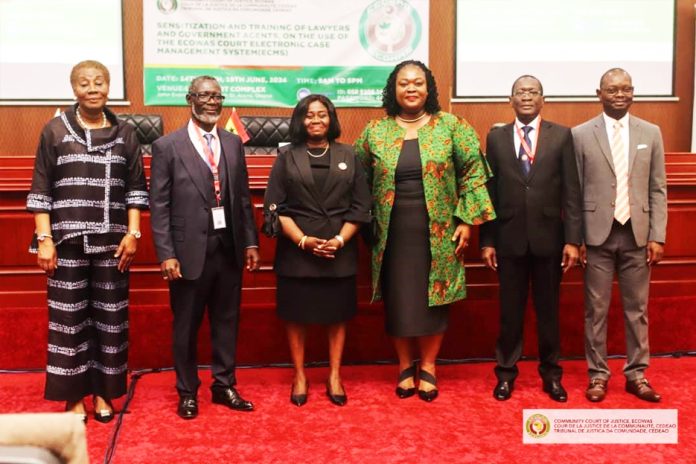The Economic Community of West African States (ECOWAS) Court of Justice has organised a sensitisation and training programme on the Electronic Case Management System (ECMS) for lawyers and government agents for English speaking member-states to increase efficiency and accessibility to justice.
The ECMS, borne out of the Covid-19 pandemic, had come to stay as a continuous means to leverage on technology to bridge gaps and overcome barriers to justice.
Justice Edward Amoako Asante, President of the Community Court of Justice, addressed the opening ceremony of the sensitisation and training programme in Accra, on Friday, June 14, 2024.
He said the aim of the training was to ensure a successful roll-out of the ECMS, which the court had committed itself to sensitising and training both private legal practitioners and government lawyers from all ECOWAS member states.
It will, therefore, equip lawyers with the necessary knowledge and skills to navigate the new system efficiently.
This training session is exclusively for Anglophone countries and same had been held in Lomé, Togo, for Francophone states early last week, all in the effort introduce the ECMS to lawyers in the Community.
“The sensitisation and training program aims to equip lawyers with the necessary knowledge and skills to navigate the new system efficiently,” Justice Asante said.
The ECMS involves electronic filling, service and notifications of court processes and on the request of parties, applications would be heard virtually on video-conferencing platforms such as Zoom and Microsoft Teams.
“Consistent with the Rules of Procedure and Practice Directions of the Court, the ECMS supports the electronic filing of applications and documents, automatic electronic service, and the electronic management of all aspects of cases from filing through delivery of judgment to post-judgment procedures and archiving of case files,” His Lordship Asante stated
The ECMS features two main modules with web interfaces – an external user portal for litigants and their lawyers, accessible 24/7, and an internal interface for judges and judicial staff.
In the short to long term, the ECMS would enhance accessibility to the Court for parties and significantly reduce the cost of litigation, which previously included expenses such as flight tickets to and from Abuja as well as hotel accommodations for parties and their lawyers.
The Chief Justice of the Republic of Ghana, Gertrude Trokornoo expressed her gratitude to the ECOWAS Court for choosing Accra for this exercise, as it is a great honour.
She indicated that the training is the second time in two years that Ghana and its judiciary have hosted the ECOWAS Court.
Justice Torkornoo underscored the important of the sessions to the host country, as it serves as an opportunity for the bench and bar to observe the regional court in session and to learn more about the practice and procedure of the court.
Diana Asonaba Dapaah, a Deputy Attorney-General and Minister for Justice commended the training programme, as it is in tandem with the importance Ghana places on Information Technology in the administration of Justice.
“The introduction of the ECMS is not just a technological upgrade, but a strategic move to streamline our judicial processes, ensuring that they are efficient, transparent and accessible to all,” she said.
The Deputy Minister also said the sensitisation and training programme was timeous, giving that it will serve as a crucial conduit to close the knowledge gap between the Court and the public it represents, facilitating a deeper comprehension of the Court’s role, its mandate and procedure.
Furthermore, the ECMS will reform how court cases are managed by digitizing court procedures, thereby speeding up trials, ensuring accuracy in records, reducing cost, providing a seamless flow of case management and improving the delivery of Justice across the ECOWAS Member States.
She used the occasion to assure Ghana’s continuous effort to abide and remain committed to the values of the Court and the principles of international law and work in concert with the Court to ensure the effective functioning of the Court for the benefit of the sub-region.
Background of ECOWAS Court of Justice
The ECOWAS Court of Justice was established under the Lagos Treaty of 1975 and set up by an ECOWAS Protocol in 1991 and became operational in 2001, following the appointment of the first judges of the Court.
Under the 1993 ECOWAS Revised Treaty, the Court is designated as the principal judicial organ of the Community, charged with the interpretation and application of the Community’s legal texts.
Since 2005, the Court’s jurisdiction has been expanded by Member States to include the adjudication of human rights cases and these cases are brought before the court mostly by individuals and NGOs against member states and ECOWAS Institutions thereby playing a pivotal role in upholding fundamental human rights, the rule of law, and good governance within our sub-region.









